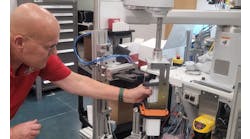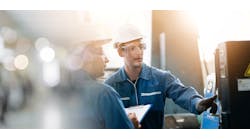This column is moderated by Béla Lipták, automation and safety consultant and editor of the Instrument and Automation Engineers' Handbook (IAEH). If you have an automation-related question for this column, write to [email protected].
Q: I am student of instrumentation engineering. I have a diploma of associate engineering (DAE) and am continuing my education. I want instrumentation books—I need books related to level, flow, temperature, pressure, pneumatics, hydraulics, electromechanical, viscosity, gravity, calibration, etc. Can you refer me to some? Please guide me.
Muahammad numan
[email protected]
Q: I have been working in design and integration for almost 25 years. I think that I already surpassed the Malcolm Gladwell 10,000 hours rule in my line of work. However, in what now is generally known as automation (early in my professional carrier, this field was called Instrumentation & Control), I often fall short with the vast amount of knowledge that we practice every day. I have been using your books for years as basic references in my daily work, and I have my own personal short list of books that I always keep on my desk. However, I would like to know what books you recommend for an automation engineer. Which do you have, and which do you recommend are must-reads?
F. Alcala
[email protected]
A: On the topic of level measurement, you might look at these publications:
- Rosemount, “Level Measurement and Tank Gauging (2019)"
- ISA: Measurement and Control of Liquid Level, an Independent learning module from ISA, ISBN-13: 978-0876646250
- ISA: "New Applications for Pressure Measurement Technologies" (also contains good advice on d/p level applications)
- Wikipedia: "Level Sensors," an overall orientation with good references
As to general automation books, I’m just looking up at my bookshelf to see which volumes are the most used and the dirtiest (some are actually falling apart from constant use). They are the classics of Greg Shinskey, Donald Eckman, Page Buckley, Hans Baumann, etc. If you want to see more complete listings, go to these web addresses:
- https://www.pacontrol.com/book3.html,
- https://nait.libguides.com/c.php?g=211293&p=1394183,
- https://www.automation.com/library/bookstore,
- https://instrumentationtools.com/instrumentation-books-download/
As to the newer publications on automation using AI, neural networks and the like for robotics, cybersecurity, etc., the list is too long. I, too, am expanding my process control coverage from writing about industrial measurement and control. I’m about to finish a new book in which I show that the methods and theory we, the process control engineers, have developed during the past century to analyze and predict the behavior and to tune (control) industrial processes apply beyond industry.
In this new book, I am trying to prove that industrial control theory can be used to analyze all processes. One of the examples I am using is the non-industrial process of global warming. After all, the heat balance of the planet is just a big, high-inertia and very interacting heat-balance process where the gains, dead times, tipping points, and final steady-state (in short, the behavior of the process), can all be calculated for both the limit-controlled and for the uncontrolled states. It’s fun to show how similar this is to calculating, say, the new steady-state hot water temperature that the outlet temperature of a balanced (constant heat input and output) hot water heater will reach if we add another layer of insulation to it.
Sorry for wondering away from your questions. I did that because I hope that you might add this volume to your reading list when ISA brings it out sometime next year.
Béla Lipták
[email protected]
A: I suggest the following books:
- Shinskey, F. G., "pH and pION Control in Process and Waste Streams," John Wiley & Sons, 1973, ISBN 0-471-78640-3.
- Shinskey, F. G., "Energy Conservation Through Control," Academic Press, 1978, ISBN 0-12-641650-8.
- Shinskey, F. G., "Controlling Multivariable Processes," ISA, 1981, ISBN 0-87664-529-5.
- Shinskey, F. G., "Distillation Control—For Productivity and Energy Conservation," 2nd edition, McGraw-Hill, 1984, ISBN 0-07-56894-4.
- Shinskey, F. G., "Feedback Controllers for the Process Industries," McGraw-Hill, 1994, ISBN 0-07-056905-3.
- Shinskey, F. G., "Process Control Systems—4th edition," McGraw-Hill, 1996, ISBN 0-07-057101-5.
- McMillan, Gregory K., "Advanced pH Measurement and Control—3rd Edition," ISA, 2005, ISBN 1-55617-851-4.
- McMillan, Greg and Vegas, Hunter, "101 Tips for a Successful Automation Career," ISA, 2013, ISBN 978-1-937560-50-8.
- McMillan, Gregory K., "Tuning and Control Loop Performance - 4th Edition," Momentum Press, 2015, ISBN 978-160650-170-2.
Greg McMillan
[email protected]
A: In addition to Bela's great response, may I also suggest, understanding that you probably have a very limited budget, joining the International Society of Automation (ISA). I would also investigate signing on to the various LinkedIn bulletin boards accessible through the ISA and others relating to our field. Some of the topics discussed are perhaps a little obscure or advanced at this point, but getting exposed to the vernacular of the trade and—more important—actual field applications, helps with the learning experience.
Peter Baker, CAP, CTech
[email protected]
A: As for the textbook, if the Lipták handbooks are too expensive, consider the ”Handbook of instrumentation” by Andrew Stiller or ”Applied instrumentation in the process industries” by William G Andrew and HB William. I would also recommend American Petroleum Institute (API) Recommended Practices (RP) 551.
Joseph Amalraj
[email protected]
A: You can find free technical ebooks in places like www.freeengineeringbooks.com and www.engineering108.com. These are a good starts.
Alejandro Varga
[email protected]
A: The best start on instrumentation reading is the www.Omega.com instrumentation handbook. It is available as a handbook and most of it is also available under “Technical Reference” on their web pages. Based upon my 47 years in the instrumentation field, the best books used to be free from the vendors. They supplied you with a lot of technical data to help you do your job and to prevent you from getting bad data. This brought repeat customers to their products. I don’t know their current availability, but I still hold dear my personal copies of these books. They give practical applications, details and data about all things instrumentation-related. They may not go into the highly technical details available in more weighty books, however, they will educate in how apply instrumentation without boring you:
- “Transducer Interface handbook, A guide to analog signal conditioning” by Daniel H. Sheingold was available from Analog Devices Corp.
- “Data Acquisition and Control Handbook” by www.keithly.com
- “Pressure Transducer Handbook” by CEC Instruments is a really good book. It pushes the ISA test methods and reports.
- “Handbook of Measurement and Control” by Schaevitz Engineering
- “Signal Conditioning & PC-Based Data Acquisition Handbook” by IOTech.
Bruce Land, ISA Fellow
[email protected]
A: The very good overview of the automation profession in a single book that includes the items you are looking for is “A Guide to the Automation Body of Knowledge, 2nd Edition” by Vernon L. Trevathan. This provides a general overview of automation, and references where you can get more information.
Curt Wendt
[email protected]
A: Some years ago, when I was in your situation, I used to download and store every article, along with books of which I felt a need. I am sending you some of these which fell into the categories you have mentioned, but remember that the internet today is a live library and every day, more books are put on its shelves. So my advice to you is, always search this library (the Internet) for updated information. I Googled “instrumentation and control engineering pdf” and got some good links:
- Control & Instrumentation Principles
- Measurement and Control Basics
- Control Station, Innovative Solutions from the Process Control Professionals
- “Process Measurement and Analysis” by Béla Lipták
Avihu Hiram
[email protected]
www.HiramEng.com
Latest from Asset Management

Leaders relevant to this article:


